Research Proposal: CVD and Cognitive Function in Older Greeks
VerifiedAdded on 2023/05/29
|8
|1621
|177
Report
AI Summary
This research proposal explores the relationship between cardiovascular diseases (CVD) and cognitive performance in older Greek adults. It addresses the high prevalence of CVD in Greece and its association with cognitive decline, highlighting the need for evidence-based recommendations for diagnosis and treatment. The proposal outlines a methodology involving a systematic review of existing research, focusing on studies with participants aged 65 and above, excluding those with neurodegenerative or psychiatric diseases. Key measures include diastolic and systolic blood pressure, socioeconomic variables, and cognitive scores. Statistical analyses, such as Pearson’s correlation and regression analysis, will be used to investigate the effects of CVD and other variables on cognitive function. Ethical considerations, including confidentiality and approval from the Research Ethics Committee, are emphasized. The anticipated findings aim to inform physicians, policymakers, and the public about the significance of age and CVD on cognitive function, promoting better care and preventive measures for older adults.

Running head: CLINICAL PSYCHOLOGY 1
Cardiovascular Disease in Older Greek Adults and Cognitive Performance
Name
Institution
Cardiovascular Disease in Older Greek Adults and Cognitive Performance
Name
Institution
Paraphrase This Document
Need a fresh take? Get an instant paraphrase of this document with our AI Paraphraser
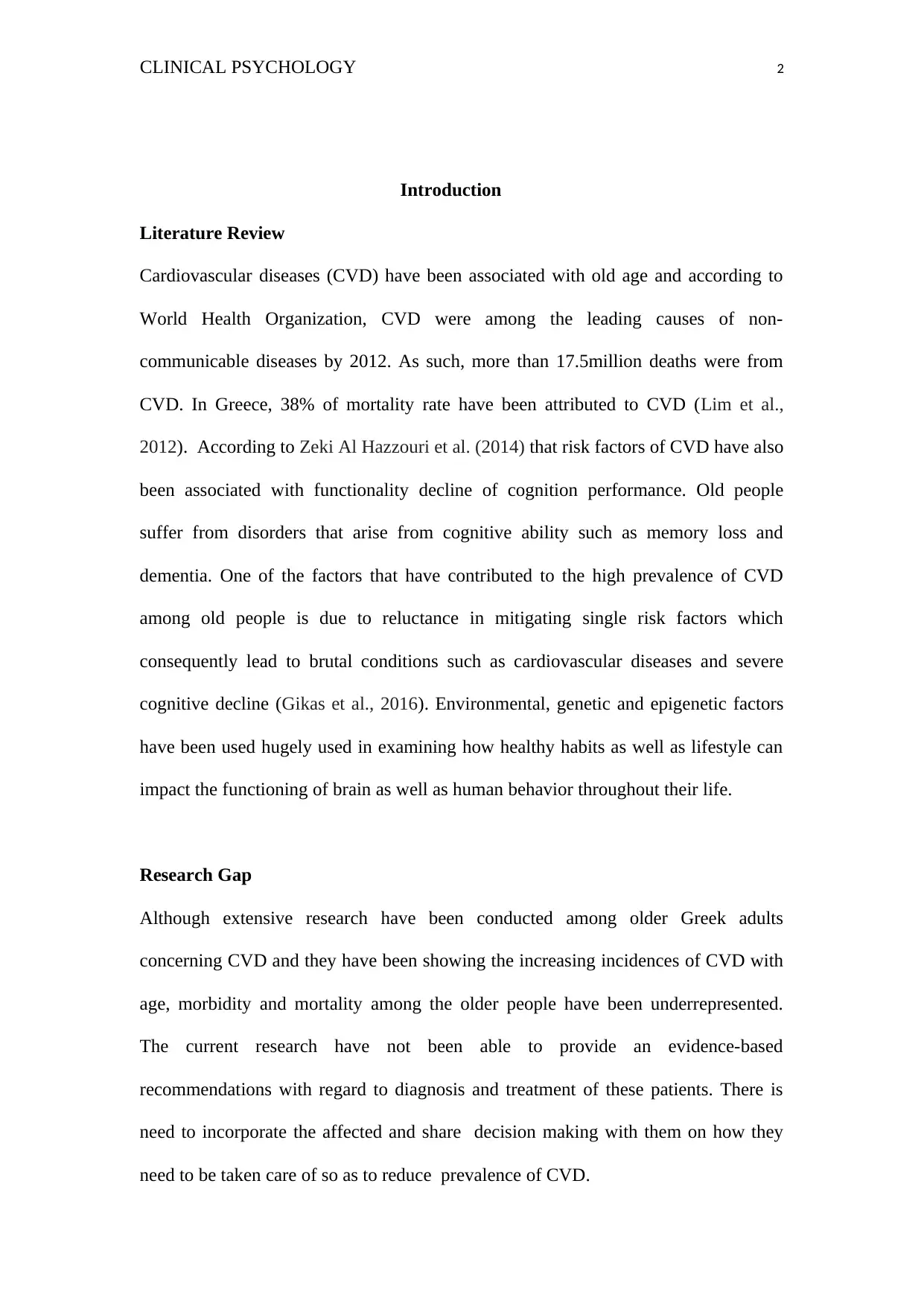
CLINICAL PSYCHOLOGY 2
Introduction
Literature Review
Cardiovascular diseases (CVD) have been associated with old age and according to
World Health Organization, CVD were among the leading causes of non-
communicable diseases by 2012. As such, more than 17.5million deaths were from
CVD. In Greece, 38% of mortality rate have been attributed to CVD (Lim et al.,
2012). According to Zeki Al Hazzouri et al. (2014) that risk factors of CVD have also
been associated with functionality decline of cognition performance. Old people
suffer from disorders that arise from cognitive ability such as memory loss and
dementia. One of the factors that have contributed to the high prevalence of CVD
among old people is due to reluctance in mitigating single risk factors which
consequently lead to brutal conditions such as cardiovascular diseases and severe
cognitive decline (Gikas et al., 2016). Environmental, genetic and epigenetic factors
have been used hugely used in examining how healthy habits as well as lifestyle can
impact the functioning of brain as well as human behavior throughout their life.
Research Gap
Although extensive research have been conducted among older Greek adults
concerning CVD and they have been showing the increasing incidences of CVD with
age, morbidity and mortality among the older people have been underrepresented.
The current research have not been able to provide an evidence-based
recommendations with regard to diagnosis and treatment of these patients. There is
need to incorporate the affected and share decision making with them on how they
need to be taken care of so as to reduce prevalence of CVD.
Introduction
Literature Review
Cardiovascular diseases (CVD) have been associated with old age and according to
World Health Organization, CVD were among the leading causes of non-
communicable diseases by 2012. As such, more than 17.5million deaths were from
CVD. In Greece, 38% of mortality rate have been attributed to CVD (Lim et al.,
2012). According to Zeki Al Hazzouri et al. (2014) that risk factors of CVD have also
been associated with functionality decline of cognition performance. Old people
suffer from disorders that arise from cognitive ability such as memory loss and
dementia. One of the factors that have contributed to the high prevalence of CVD
among old people is due to reluctance in mitigating single risk factors which
consequently lead to brutal conditions such as cardiovascular diseases and severe
cognitive decline (Gikas et al., 2016). Environmental, genetic and epigenetic factors
have been used hugely used in examining how healthy habits as well as lifestyle can
impact the functioning of brain as well as human behavior throughout their life.
Research Gap
Although extensive research have been conducted among older Greek adults
concerning CVD and they have been showing the increasing incidences of CVD with
age, morbidity and mortality among the older people have been underrepresented.
The current research have not been able to provide an evidence-based
recommendations with regard to diagnosis and treatment of these patients. There is
need to incorporate the affected and share decision making with them on how they
need to be taken care of so as to reduce prevalence of CVD.
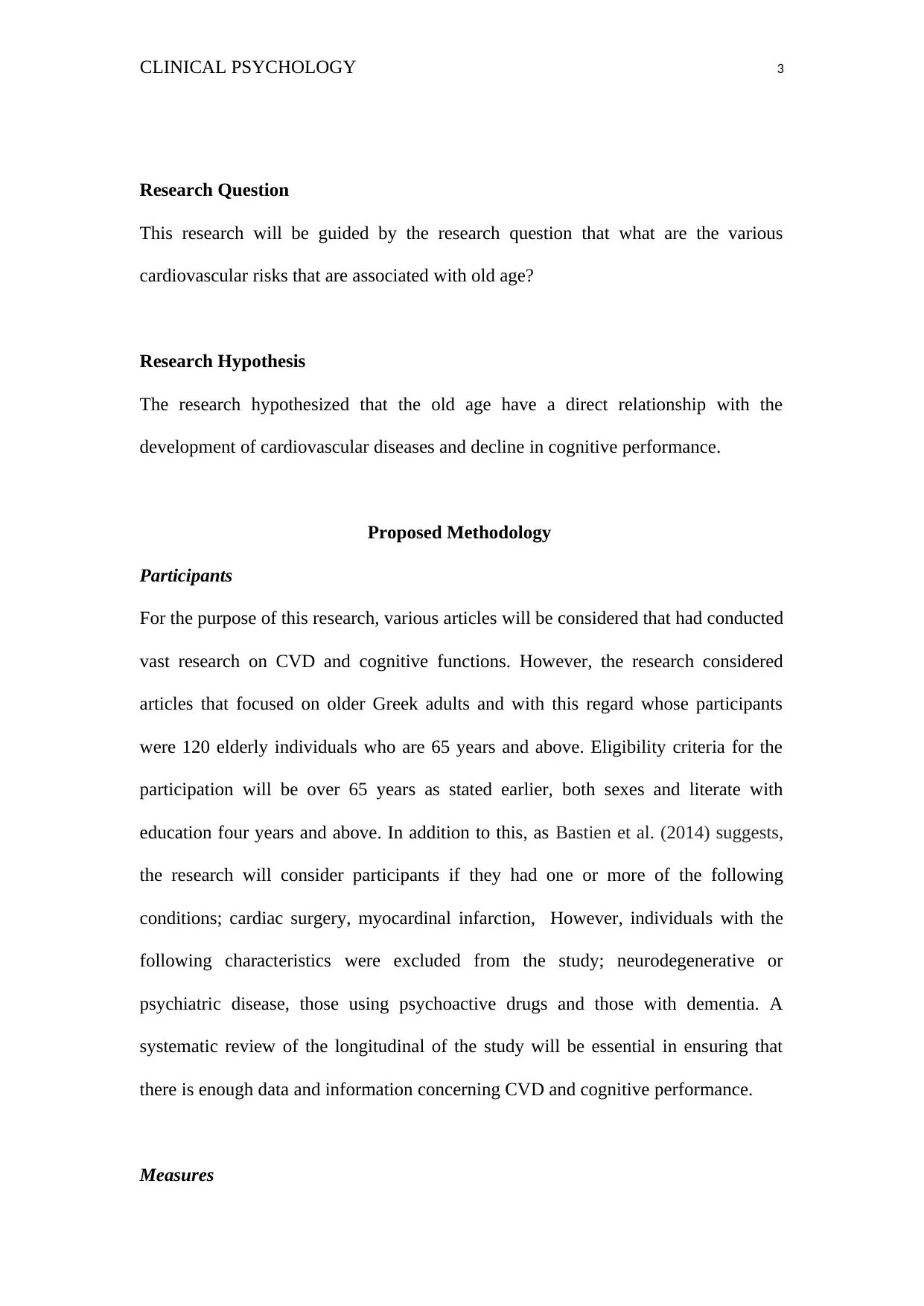
CLINICAL PSYCHOLOGY 3
Research Question
This research will be guided by the research question that what are the various
cardiovascular risks that are associated with old age?
Research Hypothesis
The research hypothesized that the old age have a direct relationship with the
development of cardiovascular diseases and decline in cognitive performance.
Proposed Methodology
Participants
For the purpose of this research, various articles will be considered that had conducted
vast research on CVD and cognitive functions. However, the research considered
articles that focused on older Greek adults and with this regard whose participants
were 120 elderly individuals who are 65 years and above. Eligibility criteria for the
participation will be over 65 years as stated earlier, both sexes and literate with
education four years and above. In addition to this, as Bastien et al. (2014) suggests,
the research will consider participants if they had one or more of the following
conditions; cardiac surgery, myocardinal infarction, However, individuals with the
following characteristics were excluded from the study; neurodegenerative or
psychiatric disease, those using psychoactive drugs and those with dementia. A
systematic review of the longitudinal of the study will be essential in ensuring that
there is enough data and information concerning CVD and cognitive performance.
Measures
Research Question
This research will be guided by the research question that what are the various
cardiovascular risks that are associated with old age?
Research Hypothesis
The research hypothesized that the old age have a direct relationship with the
development of cardiovascular diseases and decline in cognitive performance.
Proposed Methodology
Participants
For the purpose of this research, various articles will be considered that had conducted
vast research on CVD and cognitive functions. However, the research considered
articles that focused on older Greek adults and with this regard whose participants
were 120 elderly individuals who are 65 years and above. Eligibility criteria for the
participation will be over 65 years as stated earlier, both sexes and literate with
education four years and above. In addition to this, as Bastien et al. (2014) suggests,
the research will consider participants if they had one or more of the following
conditions; cardiac surgery, myocardinal infarction, However, individuals with the
following characteristics were excluded from the study; neurodegenerative or
psychiatric disease, those using psychoactive drugs and those with dementia. A
systematic review of the longitudinal of the study will be essential in ensuring that
there is enough data and information concerning CVD and cognitive performance.
Measures
⊘ This is a preview!⊘
Do you want full access?
Subscribe today to unlock all pages.

Trusted by 1+ million students worldwide

CLINICAL PSYCHOLOGY 4
At baseline, diastolic blood pressure (DBP), systolic blood pressure (SBP) will be
considered. Other aspects to be measured are the social economic variables such as
education, household income, and major lifetime occupation. Education will be
important due to its relationship with cognitive health.
Design
The association between the categorical variables will be investigated using the
analysis of contingency tables. Pearson’s correlation will be used as Thayer,
Yamamoto & Brosschot (2010) note that it is a good method to examine relationship
between cognitive scores and age. Additionally, regression analysis will be used to
investigate the effect of multiple variables on the cognitive scores. Also, the research
will focus on interactions between CVD and education and time in models of
cognitive functions as well as the dementia. The models will focus on the intercepts
and slopes. 2-way interactions will also be useful in determining the interactions
between the CVD risk by education level and incidences of disorders such as
dementia.
Procedure
The methods to be used in this study will be approved by the Local Institutional
Review Board where consent will be given to the authors of the articles and any
participant if required. Townsend et al. (2016) notes that it is prudent to consider
medical history by considering blood pressure monitoring which has been completed
using an echo cardiogram. In order to ensure that the information will be used
correctly, the study will be approved by the Research Ethics Committee of the
University.
At baseline, diastolic blood pressure (DBP), systolic blood pressure (SBP) will be
considered. Other aspects to be measured are the social economic variables such as
education, household income, and major lifetime occupation. Education will be
important due to its relationship with cognitive health.
Design
The association between the categorical variables will be investigated using the
analysis of contingency tables. Pearson’s correlation will be used as Thayer,
Yamamoto & Brosschot (2010) note that it is a good method to examine relationship
between cognitive scores and age. Additionally, regression analysis will be used to
investigate the effect of multiple variables on the cognitive scores. Also, the research
will focus on interactions between CVD and education and time in models of
cognitive functions as well as the dementia. The models will focus on the intercepts
and slopes. 2-way interactions will also be useful in determining the interactions
between the CVD risk by education level and incidences of disorders such as
dementia.
Procedure
The methods to be used in this study will be approved by the Local Institutional
Review Board where consent will be given to the authors of the articles and any
participant if required. Townsend et al. (2016) notes that it is prudent to consider
medical history by considering blood pressure monitoring which has been completed
using an echo cardiogram. In order to ensure that the information will be used
correctly, the study will be approved by the Research Ethics Committee of the
University.
Paraphrase This Document
Need a fresh take? Get an instant paraphrase of this document with our AI Paraphraser
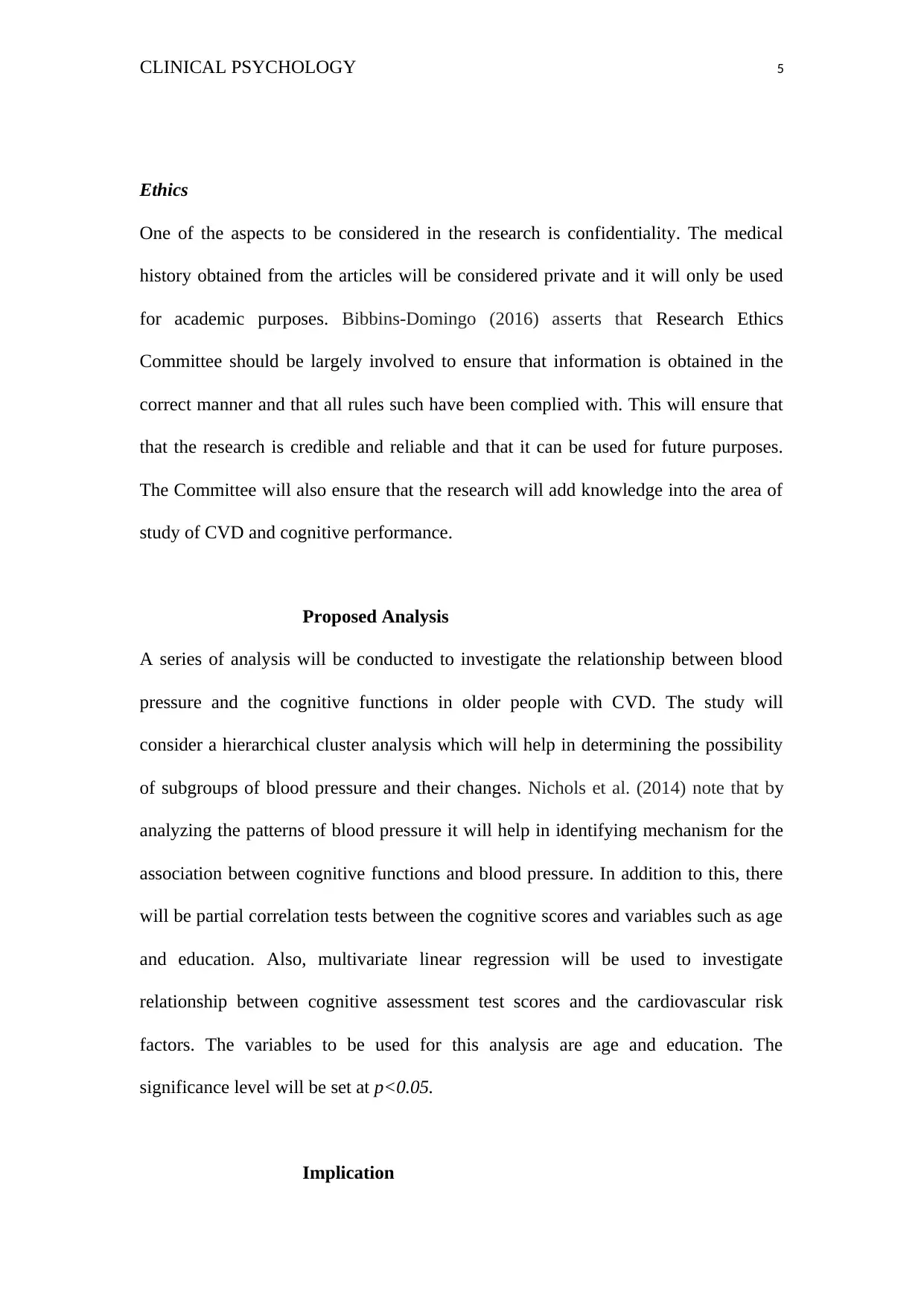
CLINICAL PSYCHOLOGY 5
Ethics
One of the aspects to be considered in the research is confidentiality. The medical
history obtained from the articles will be considered private and it will only be used
for academic purposes. Bibbins-Domingo (2016) asserts that Research Ethics
Committee should be largely involved to ensure that information is obtained in the
correct manner and that all rules such have been complied with. This will ensure that
that the research is credible and reliable and that it can be used for future purposes.
The Committee will also ensure that the research will add knowledge into the area of
study of CVD and cognitive performance.
Proposed Analysis
A series of analysis will be conducted to investigate the relationship between blood
pressure and the cognitive functions in older people with CVD. The study will
consider a hierarchical cluster analysis which will help in determining the possibility
of subgroups of blood pressure and their changes. Nichols et al. (2014) note that by
analyzing the patterns of blood pressure it will help in identifying mechanism for the
association between cognitive functions and blood pressure. In addition to this, there
will be partial correlation tests between the cognitive scores and variables such as age
and education. Also, multivariate linear regression will be used to investigate
relationship between cognitive assessment test scores and the cardiovascular risk
factors. The variables to be used for this analysis are age and education. The
significance level will be set at p<0.05.
Implication
Ethics
One of the aspects to be considered in the research is confidentiality. The medical
history obtained from the articles will be considered private and it will only be used
for academic purposes. Bibbins-Domingo (2016) asserts that Research Ethics
Committee should be largely involved to ensure that information is obtained in the
correct manner and that all rules such have been complied with. This will ensure that
that the research is credible and reliable and that it can be used for future purposes.
The Committee will also ensure that the research will add knowledge into the area of
study of CVD and cognitive performance.
Proposed Analysis
A series of analysis will be conducted to investigate the relationship between blood
pressure and the cognitive functions in older people with CVD. The study will
consider a hierarchical cluster analysis which will help in determining the possibility
of subgroups of blood pressure and their changes. Nichols et al. (2014) note that by
analyzing the patterns of blood pressure it will help in identifying mechanism for the
association between cognitive functions and blood pressure. In addition to this, there
will be partial correlation tests between the cognitive scores and variables such as age
and education. Also, multivariate linear regression will be used to investigate
relationship between cognitive assessment test scores and the cardiovascular risk
factors. The variables to be used for this analysis are age and education. The
significance level will be set at p<0.05.
Implication

CLINICAL PSYCHOLOGY 6
The findings of the results will determine the significance of age on the development
of CVD and cognitive function which will be an important research to the physicians,
government and the people in general. The research will help in closing the gap by
ensuring that the physicians are aware of the factors that contribute to the
development of CVD and they will be required to take actions to ensure the
prevalence of these conditions are reduced. For instance, by advising old people on
the type of food that they may eat or the manner in which they should live in order to
reduce increase of blood pressure and heart failures. Also, the findings will be
necessary to the government to conduct a campaign of good care towards the old
people.
The findings of the results will determine the significance of age on the development
of CVD and cognitive function which will be an important research to the physicians,
government and the people in general. The research will help in closing the gap by
ensuring that the physicians are aware of the factors that contribute to the
development of CVD and they will be required to take actions to ensure the
prevalence of these conditions are reduced. For instance, by advising old people on
the type of food that they may eat or the manner in which they should live in order to
reduce increase of blood pressure and heart failures. Also, the findings will be
necessary to the government to conduct a campaign of good care towards the old
people.
⊘ This is a preview!⊘
Do you want full access?
Subscribe today to unlock all pages.

Trusted by 1+ million students worldwide
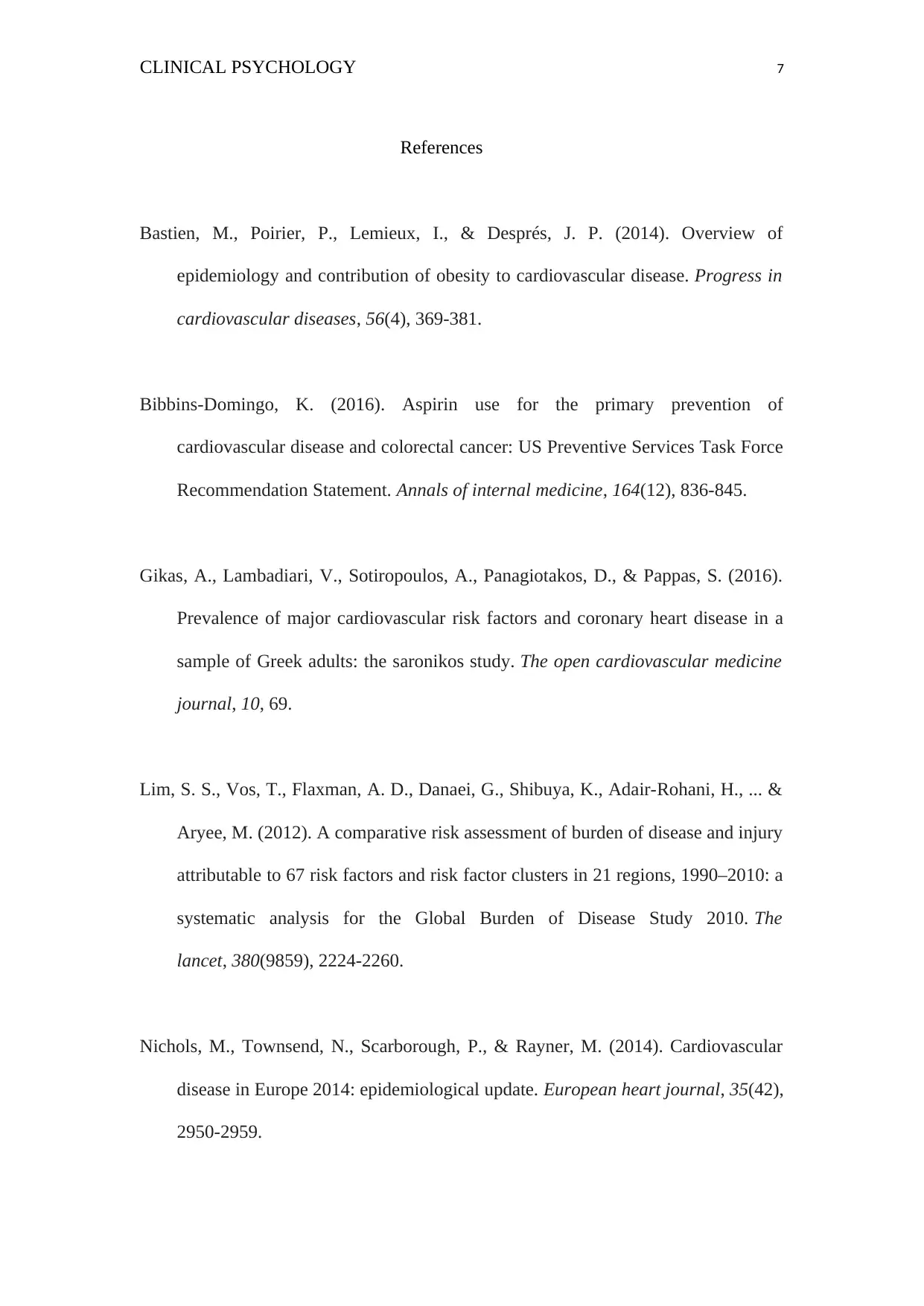
CLINICAL PSYCHOLOGY 7
References
Bastien, M., Poirier, P., Lemieux, I., & Després, J. P. (2014). Overview of
epidemiology and contribution of obesity to cardiovascular disease. Progress in
cardiovascular diseases, 56(4), 369-381.
Bibbins-Domingo, K. (2016). Aspirin use for the primary prevention of
cardiovascular disease and colorectal cancer: US Preventive Services Task Force
Recommendation Statement. Annals of internal medicine, 164(12), 836-845.
Gikas, A., Lambadiari, V., Sotiropoulos, A., Panagiotakos, D., & Pappas, S. (2016).
Prevalence of major cardiovascular risk factors and coronary heart disease in a
sample of Greek adults: the saronikos study. The open cardiovascular medicine
journal, 10, 69.
Lim, S. S., Vos, T., Flaxman, A. D., Danaei, G., Shibuya, K., Adair-Rohani, H., ... &
Aryee, M. (2012). A comparative risk assessment of burden of disease and injury
attributable to 67 risk factors and risk factor clusters in 21 regions, 1990–2010: a
systematic analysis for the Global Burden of Disease Study 2010. The
lancet, 380(9859), 2224-2260.
Nichols, M., Townsend, N., Scarborough, P., & Rayner, M. (2014). Cardiovascular
disease in Europe 2014: epidemiological update. European heart journal, 35(42),
2950-2959.
References
Bastien, M., Poirier, P., Lemieux, I., & Després, J. P. (2014). Overview of
epidemiology and contribution of obesity to cardiovascular disease. Progress in
cardiovascular diseases, 56(4), 369-381.
Bibbins-Domingo, K. (2016). Aspirin use for the primary prevention of
cardiovascular disease and colorectal cancer: US Preventive Services Task Force
Recommendation Statement. Annals of internal medicine, 164(12), 836-845.
Gikas, A., Lambadiari, V., Sotiropoulos, A., Panagiotakos, D., & Pappas, S. (2016).
Prevalence of major cardiovascular risk factors and coronary heart disease in a
sample of Greek adults: the saronikos study. The open cardiovascular medicine
journal, 10, 69.
Lim, S. S., Vos, T., Flaxman, A. D., Danaei, G., Shibuya, K., Adair-Rohani, H., ... &
Aryee, M. (2012). A comparative risk assessment of burden of disease and injury
attributable to 67 risk factors and risk factor clusters in 21 regions, 1990–2010: a
systematic analysis for the Global Burden of Disease Study 2010. The
lancet, 380(9859), 2224-2260.
Nichols, M., Townsend, N., Scarborough, P., & Rayner, M. (2014). Cardiovascular
disease in Europe 2014: epidemiological update. European heart journal, 35(42),
2950-2959.
Paraphrase This Document
Need a fresh take? Get an instant paraphrase of this document with our AI Paraphraser
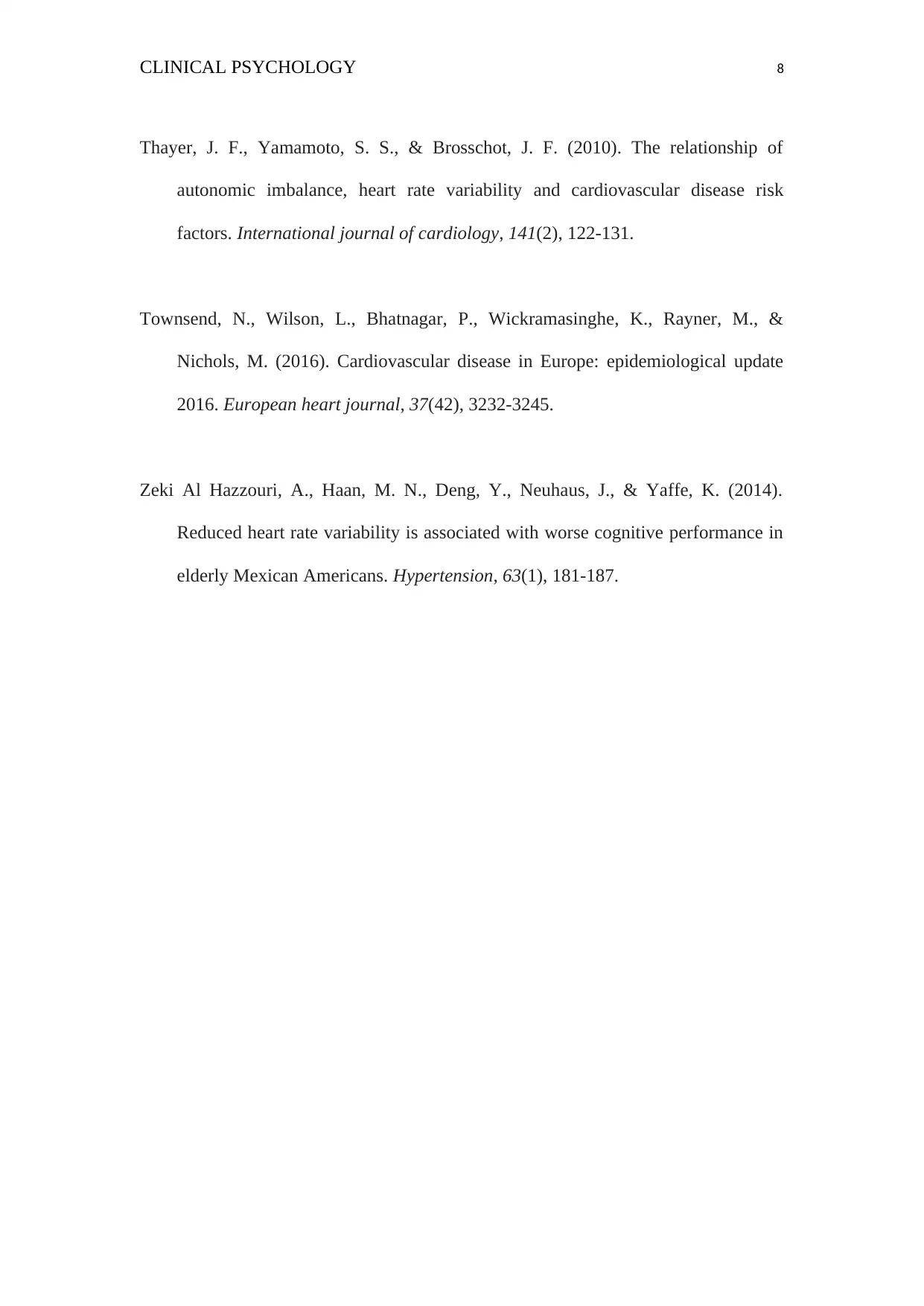
CLINICAL PSYCHOLOGY 8
Thayer, J. F., Yamamoto, S. S., & Brosschot, J. F. (2010). The relationship of
autonomic imbalance, heart rate variability and cardiovascular disease risk
factors. International journal of cardiology, 141(2), 122-131.
Townsend, N., Wilson, L., Bhatnagar, P., Wickramasinghe, K., Rayner, M., &
Nichols, M. (2016). Cardiovascular disease in Europe: epidemiological update
2016. European heart journal, 37(42), 3232-3245.
Zeki Al Hazzouri, A., Haan, M. N., Deng, Y., Neuhaus, J., & Yaffe, K. (2014).
Reduced heart rate variability is associated with worse cognitive performance in
elderly Mexican Americans. Hypertension, 63(1), 181-187.
Thayer, J. F., Yamamoto, S. S., & Brosschot, J. F. (2010). The relationship of
autonomic imbalance, heart rate variability and cardiovascular disease risk
factors. International journal of cardiology, 141(2), 122-131.
Townsend, N., Wilson, L., Bhatnagar, P., Wickramasinghe, K., Rayner, M., &
Nichols, M. (2016). Cardiovascular disease in Europe: epidemiological update
2016. European heart journal, 37(42), 3232-3245.
Zeki Al Hazzouri, A., Haan, M. N., Deng, Y., Neuhaus, J., & Yaffe, K. (2014).
Reduced heart rate variability is associated with worse cognitive performance in
elderly Mexican Americans. Hypertension, 63(1), 181-187.
1 out of 8
Related Documents
Your All-in-One AI-Powered Toolkit for Academic Success.
+13062052269
info@desklib.com
Available 24*7 on WhatsApp / Email
![[object Object]](/_next/static/media/star-bottom.7253800d.svg)
Unlock your academic potential
Copyright © 2020–2026 A2Z Services. All Rights Reserved. Developed and managed by ZUCOL.





